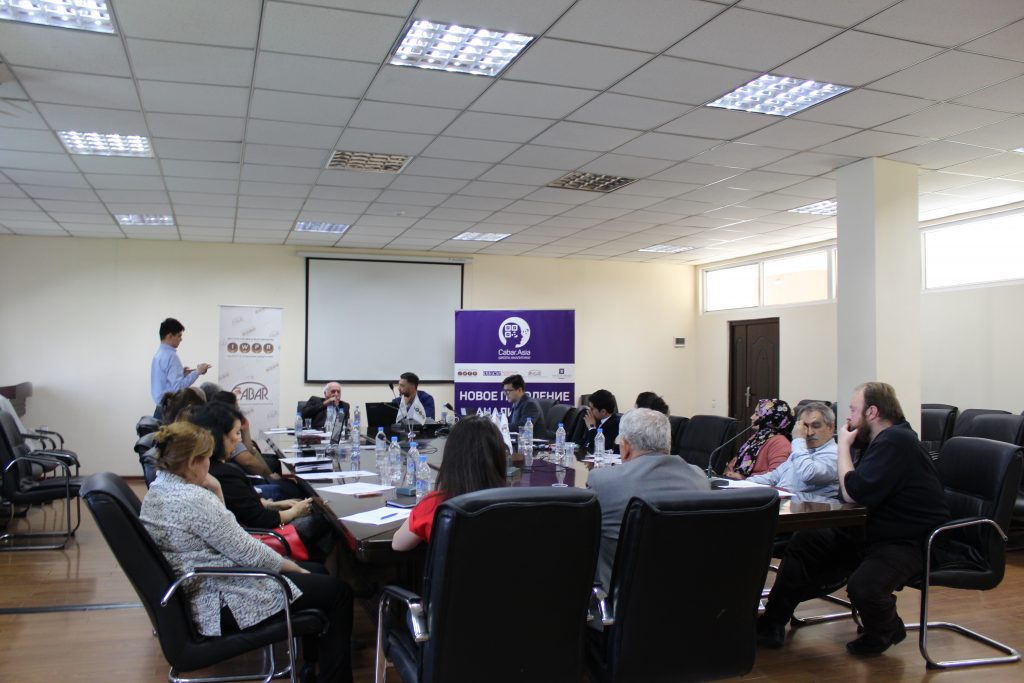On April 8, 2019, IWPR Tajikistan (the Institute for War & Peace Reporting) hosted an expert meeting titled “Introduction of the Insurance System in Healthcare of Tajikistan”. Experts, representatives of public and private organizations, independent analysts and journalists discussed the observed problems in the healthcare system of Tajikistan, the prospects for the introduction of the insurance system and offered their recommendations.
Discussion highlights:
- The specific mechanisms of the universal insurance system should be elaborated and studied in detail in the near future;
- All information on the proposed measures should be in open access and available to the public and, in particular, to expert community;
- The measures to be implemented should be accompanied by public awareness raising campaigns;
- The prices of medical services in public health facilities should be revised to better match market prices;
- The universal insurance system can be effectively linked to e-government services.
The idea of introducing universal health insurance to the country’s healthcare system was among the proposed methods of elimination of informal payments put forward by the experts. The experts were able to share their vision of the implementation of such a system in a faceto-face interactive mode and offer recommendations for the effective resolution of existing problems of Tajikistan’s healthcare.
According to the chief specialist of the Ministry of Health and Social Protection of the Population of the Republic of Tajikistan Safar Saifuddinov, about 100 thousand people work in the health care system today, and on average, a citizen visits health care organizations about 7 times per year. Over the last 17 years, the budget of the Ministry of health has grown 60 times — from 29 million somoni (about $3 million) in 2002 to 1 billion 740 million somoni (almost $184.5 million) in 2019.
IWPR Tajikistan Program coordinator Sharaf Davlatov mentioned that more than 50% of patients receive medical services under the preferential system. “The goal of our programs is to reduce the number of informal payments made by other 50% of patients,” he said.
Nigora Abidjanova, director of Open Society Institute Assistance Foundation – Tajikistan Public Health program, indicated that any initiatives related to the provision of social support to the population must necessarily take into account the demographic and economic conditions in the country.
The lawyer of the organization “Justice and Legal Relations” Abdulmajid Rizoev said the introduced norms should enable insurance companies to verify the fact of treatment. The expert concluded the health system was not yet ready to introduce universal insurance.
According to the Medical Insurance Department Head of BIMA Insurance Ilkhom Rasulov, public health care organizations are not yet ready to work with insurance companies. Today, the private health care organizations are the main partners of private insurance companies.
Experts Muzaffar Olimov and Mikhail Petrushkov expressed their doubts about the effectiveness of the proposed system of compulsory universal insurance. Olimov noted that the level of public trust in compulsory universal insurance will be insufficient due to the well-established opinion that it is impossible to get quality services for low prices. In turn, Petrushkov drew the attention of the participants to the need to change the established price lists for medical services, raising them to the level of the real cost of labor, medicines and procedures, before introducing a system of universal insurance.
Participants considered the possibility of using e-government services to support the implementation of insurance programs.
Sharaf Davlatov from IWPR Tajikistan summarized the meeting by outlining the main recommendations of the participants:
- The specific mechanisms of the universal insurance system should be elaborated and studied in detail in the near future;
- All information on the proposed measures should be in open access and available to the public and, in particular, to expert community;
- The measures to be implemented should be accompanied by public awareness raising campaigns;
- The prices of medical services in public health facilities should be revised to better match market prices;
- The universal insurance system can be effectively linked to e-government services.
At the end of the meeting, the experts expressed the hope that such discussions will continue, and the recommendations will be taken into account by decision-makers.
Source: cabar.asia


